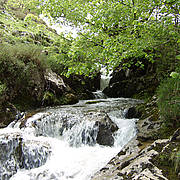Climate Change will bring Spain more than just lack of rain
07 July 2008 | News story
For a long while it looked odds-on that big international conference in Barcelona this autumn about the environment would find the Spanish host city deep in the grip of a water crisis triggered by its worst drought in 50 years.
The irony would not have been lost on the thousands of scientists, government officials and activists due to attend the World Conservation Congress, the four-yearly conference of the Swiss-based International Union for Conservation of Nature (IUCN), the world’s largest and oldest environmental network.
Global threats posed by the accelerating pace of climate change are a core theme of the October 5-14 congress, and for Spain, water shortages rank high amongst the potential problems of a warming world. A recent government report warned that water resources could shrink 22 percent by the end of the century.
Barcelona’s crisis forced city authorities to impose a series of restrictions, including bans on hosepipes to water gardens and the filling of swimming pools. The central government in Madrid also brought pressure to bear on the neighbouring region of Aragon to accept the diverting of water from the river Ebro to make ensure Barcelona was not left short of drinking water.
In the end, unusually heavy rains in May, the third wettest in the last 60 years, and which continued in early June, saved the day for the Catalonian city and reservoir levels in the region recovered to over 50 percent of their capacity after having fallen to below 20 percent.
The emergency measures were suspended along with the politically controversial extraction of water from the Ebro, But the 18-month drought was undoubtedly a sip of things to come, not least in terms of its political consequences, with water – or the lack of it - being forecast to be a major source conflict in many parts of the world in the current century.
“The grave drought that affected the metropolitan area of Barcelona was an important example of the type of event that the scientific community has been for a long time saying will happen in the south of Europe as a result of climate change brought on by human action,” said environmental economist Antxon Olabe, an analyst with Naider, a Spanish consulting concern specialising in sustainable development.
PARTICULARLY VULNERABLE
Like much of southern Europe, Spain is particularly vulnerable to the impact of rising global temperatures, which scientists see bringing more extreme weather conditions, such as heat waves and cyclones, to many parts of the world, along with more frequent droughts and flooding. Sea levels are expected to rise, in the Mediterranean as elsewhere, as ice caps and glaciers melt.
While global temperatures have risen 0.6º Celsius over the past 100 years, temperatures in Spain have jumped 1.5º, which is around 50 percent above the 0.95º average rise for Europe as a whole.
On current trends, Spain’s National Meteorological Institute sees the thermometer rising 5º-8º by the last three decades of the 21st century, well above the 2º warming that the United Nations sets as the global limit beyond which irreparable changes will be inflicted on ecosystems and humankind’s way of life.
The prospect has raised the spectre of the rapid “Africanisation” of the Iberian peninsula, particularly in the south and along the Mediterranean coastline, as a hotter and drier climate turns swathes of an already arid country into desert and beats a path for the entry of sub-tropical diseases so far unknown in Spain such as dengue, Rift Valley fever and malaria.
In a report to the government late last year 50 of the country’s leading experts in climate and the environment gave a stark warning of what lies in store for Spain if global warming exceeds the ceiling indicated by the United Nations’ International Panel on Climate Change (IPCC), co-winners, along with former U.S. Vice-President Al Gore, of the 2007 Nobel Peace Prize.
Large tracts of beach along Spain’s Mediterranean coastline, the holiday destination of choice for millions of northern Europeans, could be lost to rising sea levels, while temperatures in July and August, the months which see the largest influx of visitors, could simply become too hot for comfort even for the most ardent sun-seeker.
The country’s bio-diversity will suffer, with many species of animals, plants and vegetables disappearing. For the country’s reptile and amphibian species, the extinction rate could reach 97 percent.
“Terrestrial ecosystems will be submitted to changes in conditions not seen in millennia,” the report warned.
Along with its European Union partners Spain is a signatory to the 1997 Kyoto Treaty under which most of the world’s richest countries committed themselves to reducing emissions of greenhouse gases, such as carbon dioxide, or CO2, which scientists say are fuelling global warming.
But in Spain’s case the Kyoto commitments proved, at least until recently, to be largely a statement of intentions rather than a true government priority.
As in many other countries around the world, economic growth, aimed at wiping out the income gap with Europe’s richer states, took political precedence. Furthermore, the route to growth was paved – almost literally – with higher greenhouse gas emissions as the construction industry took a leading role in generating the country’s wealth and employment.
Far from being restrained, the country’s greenhouse gas emissions continued to expand and rapidly. According to the climate change report to the government, by the end of 2006 emissions were 48.1 percent above 1990 levels, the base year taken for cuts under the Kyoto accord. This will make it extremely difficult for Spain to achieve its 15 % green house gas reduction target
But with election to power of the Socialist government of Prime Minister José Luis Rodríguez Zapatero in 2004, the mood began to change, perhaps helped by mounting international evidence, and political acceptance, of the role of humans in climate change.
“The fight against climate change is an absolute priority for any responsable government in these times and we cannot lose even a minute,” Zapatero has said.
Besides comissioning the experts’ report, with its bleak outlook if nothing is done, the government has adopted a national plan for combating climate change and introduced a number of measures, including regulations requiring all new buildings to generate some of their power needs from solar energy, in which Spain is well endowed.
Unfortunately, the results do not yet match the promises and the policies. Last year, emissions of greenhouses gases by the electricty sector, the largest single source of CO2, rose a further 5.5 percent.
“While everybody from the end consumer to the prime minister talks of the urgent need to reduce greenhouse gas emissions, in practice we are going in the opposition direction,” says Margarita Astrálaga, Director of the IUCN Office for Mediterranean Cooperation.
“After years of interminable debates we have to move to effective and responsible action now; otherwise meeting the Kyoto objective will become almost impossible – and the damages to Spain’s biodiversity irreversible,” she added.
It is precisely the need to move to effective action – not just in Spain but across the globe – that delegates will address at the IUCN congress in Barcelona, with its call for a “new climate for change.”
written by Richard Waddington






